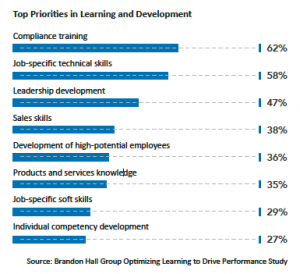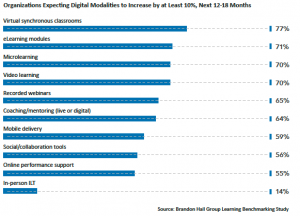
In Brandon Hall Group’s HCM Outlook 2021 Study, 6 in 10 organizations place a high value on determining upskilling/reskilling priorities related to changing business conditions. Approximately half are optimistic they can develop the workforce skills required for the future.
That optimism may be misplaced. Our research also shows that few organizations are fully prepared to develop those future skill sets and most organizations don’t have learning strategies to drive the innovation or technology that makes reskilling scalable.

Employers face tough challenges in upskilling and reskilling employees. New tactics, tools, and coding languages are being developed at lightning speed. It’s happening so quickly, a new skill can be obsolete by the time an employee develops a proficiency.
This situation makes it difficult for organizations to know what types of skills development is worth investing in. That’s critical because the majority of organizations don’t believe their learning budgets will increase in the foreseeable future, given the current and forecasted economic outlook.
The Key to Success
Leverage technology to:
- Identify skills gaps
- Make skills recommendations
- Deliver personalized reskilling programs
Based on interviews with leaders across several industries, many organizations still manually identify and curate skills. That is unscalable and unpredictable—and is basically guesswork. Learning should be targeted, tailor-made, and engaging for learners, automatically matching individual aspirations with organizational priorities.
Organizations with the agility to identify skills gaps and develop these skills in-house quickly and efficiently have a distinct advantage over their competitors. Those unable to effectively leverage learning technology and digital content to upskill and reskill employees as the organization evolves will struggle in a hyper-competitive environment.
Post-Pandemic
The ability to personalize learning through digital modalities is more important than ever because of the increase in remote workers who need to access content. Even when the COVID-19 pandemic recedes, our research shows that more than 60 percent of organizations will have at least one-quarter of their workforce working remotely. Approximately 30 percent of employers expect to have half or more of employees working remotely. That is about three times more than before the pandemic.
Because of the additional remote workers who had generally positive experiences with digital learning during the pandemic, most organizations plan to increase their investment in digital learning, while 64 percent of organizations plan to decrease their investment in live instructor-led training over the next two years.
In an expanded remote workforce, organizations require digital tools to address the skills of the future. Learners must connect with peers and their managers to collaborate and learn how to apply their skills to specific roles and situations. If managers and remote employees are not connected and training can’t be virtually accessed in the flow of work and the moment of need, it will be impossible to upskill and reskill in this disruptive environment.
Alignment Is Key
Employers that can align in-house skill sets with business objectives in real time will have a huge advantage over competitors still scrambling with manual reskilling programs. Automating employee reskilling through artificial intelligence- (AI) and machine learning-based self-learning technology also is a much more scalable way of ensuring an agile workforce.

Organizations that want to excel in upskilling and reskilling employees must address these key issues. How do you:
- Determine skills gaps in your organization?
- Acquire these skills?
- Target the appropriate employee for training in a desired skill?
- Track learning consumption?
- Encourage employees to take learning courses?
Leading-Edge Technology Is Critical for Reskilling
Employers need technology to identify skills gaps and deliver engaging, personalized, and relevant learning experiences to their employees to close these gaps.
The best technologies leverage AI and machine learning algorithms to analyze the skills needed to meet upcoming challenges and make learning recommendations for each employee based on their current job and career goals.
This personalized learning path empowers employees to take charge of their own reskilling journey, facilitated by the Learning and Development team, while providing the organization with an agile workforce that can adapt to changing conditions and opportunities.
A strong solution allows you to:
- Define the experience you want your learners to have and easily enroll them
- Set up personalized learning plans and programs
- Define a gamification strategy
- Export learning data to human resources information systems (HRIS) and talent management solutions
- Create a content strategy
- Define user groups
- Devise an engagement strategy
- Set up reporting that meets your organization’s specific needs
Time to Learn
Brandon Hall Group research shows that when employees had downtime during the pandemic, and learning assets were available and targeted toward their interests or development goals, they often used that time to access learning. This can be aided by delivering a personalized experience that encourages employees to browse through what interests them.
Employers should continue to encourage employees to allot weekly time to access learning linked to their performance goals and career objectives—something that only about one-third of organizations were doing before the crisis.
In most organizations, non-management employees spend, on average, less than 50 hours a year in competency and skills development training. Leaders and managers in most organizations spend less than 50 hours per year on any type of training.
A major reason training time is so limited is that learning is seen as an event outside of work. But if learning is personalized through technology, learners can access skills development training in the flow of work and as their workload allows.
Organizations now must reinforce the importance of learning and encourage employees to take ownership of their own skills development. Your learning technology should be able to make learning recommendations based on learner information from other systems of record and by allowing employees to update their interests. Employees should have personalized learning plans that allow them to track their own progress, and should be able to access a digital dashboard that links their learning to personal and career objectives.
Engagement can be driven further by rewarding positive behavior through gamified elements such as points and badges. Those things occur in only about one-third of organizations. The right technology makes it that much easier.
Click here for information on Brandon Hall Group’s Professional Certification Program
Claude Werder is senior vice president of Research Operations and principal Human Capital Management (HCM) analyst at Brandon Hall Group. The firm’s vision is to inspire a better workplace experience, and its mission is to empower excellence in organizations around the world through its research and tools. Brandon Hall Group has five HCM practices and produces Brandon Hall Group’s HCM Excellence Awards and the annual HCM Excellence Conference, in West Palm Beach, FL.




